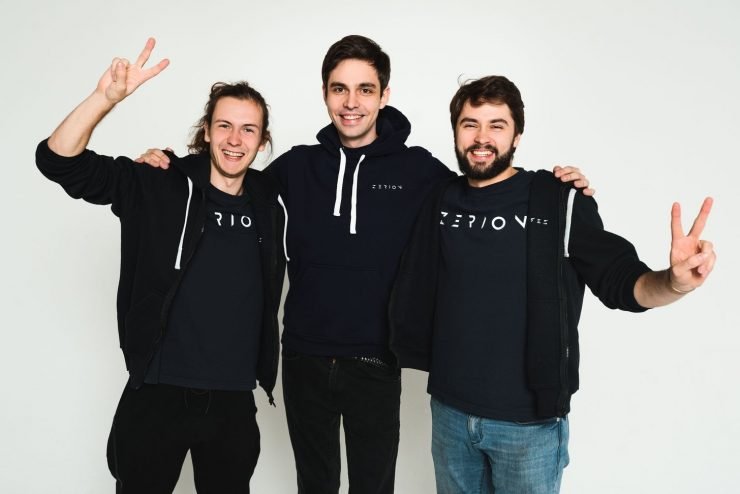When Zerion CEO Evgeny Yurtaev and his co-founders Alexey Bashlykov and Vadim Koleoshkin first raised money for their startup in 2019, it was the bear market, nobody knew them, investors had other priorities in the decentralized finance (DeFi) space, and they had to fly to San Francisco in person.
“We rented the crappiest apartment ever and we were meeting a lot of people — finding the first people to believe in us was a pretty tough challenge,” Yurtaev recalled in an interview with Icebreaker. “In the early days, everyone was excited about the protocols, and then only afterwards about the actual applications. A lot of investors were not at all even considering interfaces.” (If you’re wondering how old someone talking about the “early days” of DeFi can be, he is 25.)
What Zerion was trying to do was disrupt the user experience for the early DeFi adopters.
“We knew the steps to make this easier,” Yurtaev said, describing getting started with DeFi as “insanely painful.” “And we saw that, you know, because the space is so open, it’s going to be so many things for an average normal user to figure out, then, you know, it has to be a service that would essentially aggregate those things.”
Earlier this month, they announced a $8.2 million Series A funding round, led by London-based Mosaic Ventures, with Placeholder, DCG, Lightspeed and Blockchain.com Ventures participating.
Fundraising for this latest round was different. DeFi was grabbing more attention in the mass consciousness on the back of the Bitcoin rally and wider cryptocurrency adoption by institutional investors and traditional finance players. The COVID-19 pandemic also made investors more comfortable allocating funds to remote founders, even Russian-speaking ones.
In 2021, Zerion’s predominantly Russian, remote team was able to impress and secure investors… remotely. Most of the company’s product team is still based in Russia, with others working in the U.S., France and other parts of Europe. The team will reach 20 people by the end of summer.
The app, which allows users to access more than 50,000 digital assets and 60 protocols on the Ethereum blockchain while using their personal wallets, now has 200,000 monthly active users, compared to just 5,000 at the start of 2020. Zerion processed more than $600 million in transaction volume and raised a total of $10.2 million to date.
Yurtaev says it helped that many of the investors were using the platform themselves this time around.
“Evgeny, Vadim, and Alexey have blown us away at every turn – a talented crypto-native team who have been building decentralized applications on Ethereum together since their teens,” said Mosaic Ventures in their statement, describing Zerion as a “single hub for all our DeFi interactions.”
Investors like Mosaic are also excited about what’s next for Zerion.
“Looking to the future, Zerion’s intrigue runs deeper,” Mosaic notes. “We see the team as uniquely positioned to build the largest index of financial instruments on Ethereum and other public blockchains.”
I spoke to Zerion’s CEO about his plans, the future of DeFi, superiority of the noncustodial model, and fundraising lessons for founders from less represented backgrounds in Silicon Valley.
The interview was conducted in English and condensed for clarity.
Icebreaker: When you look at DeFi now versus 2019, where it is going, how would you describe this space?
Evgeny Yurtaev: Obviously, DeFi had a lot of hype last year and this year. The way I look at all markets is it’s always good and bad, good in terms of getting more actually interested people into the space and developers and funding coming from more long-term capital. And at the same, it does bring a lot of noise. So it becomes really hard to tell where the truth is, what opinion you should be listening to. From that perspective, I think that’s kind of usual for the crypto space because it’s so volatile. It does have its cycles. And now we’re kind of in the second bull market. People who stay within the space are the ones who actually care, that’s how I would describe that.
Icebreaker: Could you walk me through the original idea for Zerion, why this approach?
Yurtaev: We, first of all, we’ve been in this space for a long time. We’ve built multiple products that are all somewhere around the user experience and essentially end products for the user. With this one, I think we just first observed that on the market, there were just a few products, which were really like basic trackers. We thought that you know, that’s kind of weird in the future of finance, you have to manually input the tokens that you have, that seemed strange to me. That’s kind of the start of that.
And then because we were helping companies to launch their ICOs, we knew quite a bit about the overall token distribution process and how the smart contracts work. We were building the system, kind of like a B2C system that will help our investors who invest through the platform, we want them to be, you know, become our users. So we want to shift from B2B to B2C.
At some point, we realized that we can just combine these two things. And we’ve also tried DeFi ourselves, and it was so painful to use.
Icebreaker: You mentioned many of your investors are users of the app. Internally, what hypothesis did you have about your early adopters? Is the next wave of users people who just want to have things a little bit easier?
Yurtaev: It’s a balance in a way. It’s really hard to build for someone who doesn’t exist. So if you’re trying to build for, you know, everyone in the world, that’s probably not gonna work, because you actually don’t know what exactly they want. So essentially we were always just lowering the bar of entry into this space. So artists can join the space and find the app easy to use. I see it as a progression: you start with a more complicated product, and you simplify it over time. You kind of make the product guide the person, depending on what their level of experience is. The example that I like to use is something like a Mac. Anyone can use a Mac. But then if you’re a designer, a writer or a coder, you can do all of these things pretty easily on the Mac. So I think it scales as you grow, that’s how we like to see the product.
Icebreaker: What differentiates Zerion from competitors in terms of risks?
Yurtaev: What users usually like about us is that it’s one of the most simple apps within the space, the experience is tailored for people who have a crypto wallet. This simplicity is one point of it. Speaking about the risk, essentially the risk is the same as with using say any other platform. So at Zerion, we do not try to create a custody for your clients or we don’t try to create our own smart contracts in order to access DeFi.
It already scales with your experience within DeFi. So, for example, if you have an unclaimed airdrop, or you have money in a compound — all of these things would be visible on Zerion, but wouldn’t be visible in many other interfaces.
Icebreaker: Can you say more about the issue of users not having control over their wallets?
Yurtaev: It’s very important. Yeah. We never have access to the user funds. So that’s kind of like the premise that we started with, we think that the future is non-custodial, users would be managing their own secrets themselves, essentially. Looking at other competitors that are doing something similar, you have guys like Coinbase and Robinhood, in a way doing some crypto stuff or like even Revolut doing some crypto stuff.
All the old fintech companies and some of the new crypto companies and exchanges, they obviously rely on the custodial model. And that’s good for the short term. But we think that, ultimately, the noncustodial model is better. Most people prefer that in the end.
And I believe it won’t create issues for authorities as well. People are concerned that users would be using blockchains for money laundering or criminal activities. But I believe because it’s all tracked, it’s actually easier to track the funds on a chain versus like tracking the funds, say like when they are entered in one single exchange. From that perspective, I think all the challenges of the non-custodial model can be solved.
Icebreaker: Can you tell me more about your plans to build “PageRank for DeFi”? Is your mission to become Google of the DeFi ecosystem?
Yurtaev: We have built a wallet “interface” that is already much smarter than any wallet out there. The next challenge for us is to build out the wallet itself, so users can start their DeFi and Web3 journey on Zerion. We want to become your navigator in this new Internet of Value.
Icebreaker: What advice do you have for founders fundraising for the first time?
Yurtaev: Picking an investor is one of the most important things you could be doing. We pick the people who understand how these markets work. If you are in Russia, a lot of investors will be pressuring you to start, you know, generating revenue right away or hit certain milestones until they will fund you. Stuff like that does show the lack of trust of an investor in your company or you in particular, so that means that you probably shouldn’t have chosen that investor.
You really need to get along, you’ll be spending quite a bit of time together. If you really want some support, and not just money from the investor.
Icebreaker: Do you think the pandemic helped investors get comfortable with remote fundraising and building that trust?
Yurtaev: Yes, that’s for sure. I think that it really helped. I’m super glad that an online meeting can be viewed as being as insightful and genuine as a physical meeting. I think this is a game changer. Two years ago, if we hadn’t gone to San Francisco, I don’t think we could have raised funds over Zoom. But now it’s a different story.
Icebreaker: Do you have other advice for Russian-speaking founders specifically?
Yurtaev: I think the best thing to do is focus, I’ve been told that nearly a million times. And I think Western founders know that better, probably because they just have a lot of examples around them. And Russian founders usually do not simply because every company tries to do everything. So they try to conquer a lot of niches like Yandex, for example. And because you only have these companies as the most successful companies, you kind of want to build something similar, right?
If you’re building a fintech company, when the Russian founders [are] present [involved], it’s always a bunch of things bundled up together. And, obviously, that’s the end goal for a lot of companies to be everywhere, to have a lot of products. But the only question is, at your stage is, how are you going to get there? And the answer is not to bundle more things together to become more compelling.
So you have to scrap everything that you don’t know how to do yet, just do one thing first, make an MVP, show it that it works, and show that some users actually love it. And then you will be able to fundraise much easier.
Icebreaker: What is your long-term vision and mission for Zerion, in terms of the future of DeFi and increasing access to financial opportunities?
Yurtaev: This is a very personal story to all of us as founders. We lacked access to finance from childhood essentially, the ruble collapsed multiple times when I was young. Now, it’s still hard to go from crypto to FIAT if you’re Russian. We believe that people should have access to finance no matter where they live, their nationality or race. DeFi fits really nicely with this narrative, so I believe that in the future, we’re going to have a lot of opportunities and a more efficient market, and providing access to it and making it simple is what we are here to do.






Interesting!